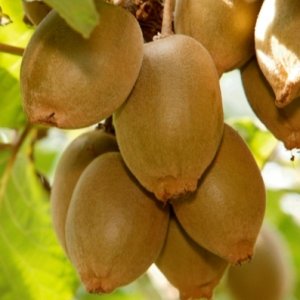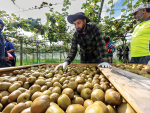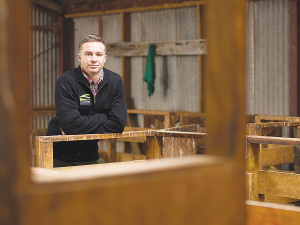A second bank, Rabobank, has also contributed to the programme, and further contributions have been made by the Te Puke Fruitgrowers Association, The Green Growers Association and Alto Packaging.
ZESPRI's Psa Innovation general manager, Dr David Tanner, says the sponsorships were a sign of confidence in the progress being made by the Psa R&D programme toward establishing a commercially viable pathway forward for the kiwifruit industry.
"It is great that ANZ National and Rabobank are contributing to the R&D pathway out of Psa. From early on in the Psa crisis they have been clear in their support for the industry and for their grower clients who have had orchards hit by the disease."
Tanner says the support from the banks, Alto Packaging, and from local fruit growing associations, is a sign of the united approach taken by the kiwifruit industry to work together to get through the devastation caused by Psa.
"ZESPRI has recently announced the first step in a Psa recovery pathway, with the wide scale release of a new Gold kiwifruit variety known as Gold3. Critical to the success of the recovery will be an ongoing commitment to R&D, which is also why support from these key industry partners is so welcome," Dr Tanner says/
Graham Turley, ANZ National's managing director agri and commercial, says the bank is proud to get behind the research programme.
"As the leading bank for the kiwifruit industry, we're committed to working with the industry so it can come through this crisis as strong as possible," Turley says.
"To achieve this, we must first have a solid understanding of where the industry stands on this crisis, and where it is going. The Psa Research and Development Programme will help provide the knowledge to manage the challenges ahead.
"Often, a crisis brings out the best in people, and that's certainly been the case with Psa. It has been incredibly heartening to see the whole industry working together, and working really hard to find solutions. This is an important industry initiative that we are proud to be part of."
ANZ National has also invested in a working group of experts from across the bank to keep it up to date with what is happening in the orchards and with the growers, and has appointed a Director - Kiwifruit, to ensure it has a central base of knowledge and understanding of the impact of Psa.
Rabobank's chief executive officer, Ben Russell, says Rabobank's contribution to the research programme was part of the bank's commitment to working with the kiwifruit sector in its efforts to develop strategies to mitigate Psa.
"Led by ZESPRI and Kiwifruit Vine Health Inc, the kiwifruit industry has responded quickly to Psa and there are a number of promising mitigation strategies under development, using a combination of management and genetics. Time will tell how successful these will be, but it is encouraging to see the first steps on the pathway to recovery now being taken," he says.
"As a specialist in agribusiness, Rabobank understands the variables in agriculture and takes a long-term outlook in supporting clients through periods of difficulty, such as the Psa outbreak. Rabobank will continue to work closely with our clients, and with the kiwifruit sector as a whole, to achieve financial viability in the longer term."
KVH chief executive, Barry O'Neil, says support for the research programme from leading financial and industry organisations is extremely encouraging for growers.
"These sponsorship initiatives are indicative of the goodwill amongst our stakeholders and their backing for our work to find Psa solutions that will return the kiwifruit industry to optimal health and production."



















